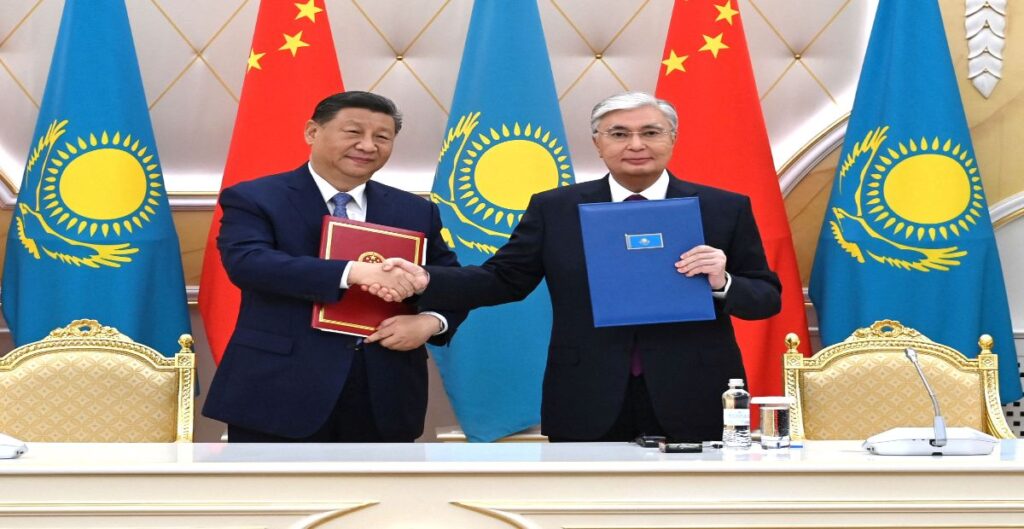Kazakhstan’s BRICS Ambitions Backed by China: A Strategic Move on the Global Stage
Astana, Kazakhstan – July 3, 2024 – In a significant diplomatic development, Kazakhstan’s President Kassym-Jomart Tokayev and China’s President Xi Jinping recently concluded talks in which President Xi formally endorsed Kazakhstan’s bid to join the BRICS bloc. The meeting, held in Kazakhstan’s capital, marks a pivotal moment in the nation’s foreign policy as it seeks to elevate its status on the global stage.
A Drive for BRICS Expansion
President Xi’s support comes as the BRICS group—comprising Brazil, Russia, India, China, and South Africa—considers further expansion to counter Western economic dominance. Xi encouraged Kazakhstan to "play the role of a middle power on the global stage and make its due contribution to global governance," signaling China’s strategic interest in diversifying and strengthening the coalition.
Originally coined by Goldman Sachs economist Jim O’Neill in 2001, the BRICS acronym represented emerging market economies with significant growth potential. The grouping was formalized in 2009 and included South Africa in 2010. Recent years have seen a renewed push for integrating more nations into BRICS, with Saudi Arabia, Iran, Ethiopia, Egypt, and the United Arab Emirates receiving invitations last August. Despite having been invited, Saudi Arabia has yet to join the group officially.
Russian Leadership and Future Plans
As of January 1, 2024, Russia assumed the rotating chairmanship of the now-expanded BRICS. The upcoming summit in Kazan, Russia, scheduled for October 22-24, will be the first to include the new member states. This summit is anticipated to be a landmark event, aiming to foster cooperation between BRICS and other regional bodies. Yury Ushakov, Russian presidential foreign policy aide, emphasized the focus on integrating newcomers into BRICS culture and strengthening partnership mechanisms during Russia’s tenure.
Earlier in March, Ushakov highlighted Russia’s plan to host an Outreach/BRICS Plus summit in Kazan, extending invitations to leaders from the Eurasian Economic Union, the Commonwealth of Independent States, and the Shanghai Cooperation Organization, among others. These steps aim to reflect the broader interests of the Global Majority, essentially the developing and emerging economies.
Kazakhstan’s Path Forward
Kazakhstan’s potential accession to BRICS aligns with its broader strategic goals. The nation is already a member of several key regional organizations, including the Eurasian Economic Union and the Shanghai Cooperation Organization, of which the latter is currently holding a heads of state meeting from July 3-4, attended by Xi Jinping.
During their bilateral discussions, Presidents Xi and Tokayev also agreed to bolster their economic ties by doubling their two-way trade, highlighting the multifaceted nature of their partnership.
Implications for Global Governance
Kazakhstan’s integration into BRICS could significantly alter the balance of power within the group and potentially enhance its influence in global governance. This development fits within a larger geopolitical contest where China and Russia seek to create a multipolar world order, reducing Western hegemony in economic and political affairs.
As the Kazan summit approaches, all eyes will be on how these emerging alliances and new memberships shape the future trajectory of BRICS and its role on the global stage. For Kazakhstan, joining BRICS could be a leap forward in asserting its influence and fulfilling its middle-power potential.
For official updates on Kazakhstan’s foreign policy and trade relations, visit the President of Kazakhstan’s official website.
This report is an evolving story capturing a critical juncture in international relations as nations realign their affiliations to better navigate the complex global landscape. Stay tuned for further updates.
